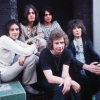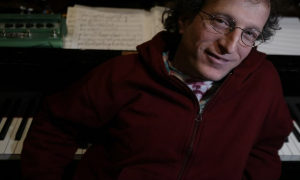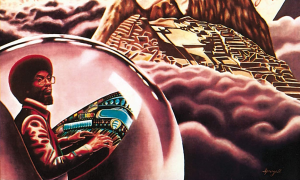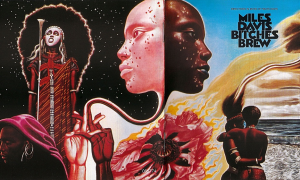Home » Jazz Articles » Rediscovery » Yes: Relayer
Yes: Relayer
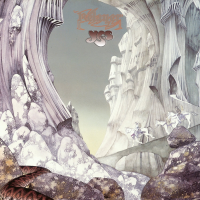 Yes
YesRelayer
Panegyric
2014 (1974)
Today's Rediscovery is an anomaly in the catalog of one of progressive rock's most innovative groups of the late 1960s/early '70s, and how better to experience it than with Steven Wilson's upgraded 2014 stereo (and 5.1 surround sound) remix, as the former Porcupine Tree frontman nears the release of his own Hand. Cannot. Erase. (Kscope, 2015).
But back to Relayer. Wilson has described Lizard (DGM Live, 1970)—the first of his run of King Crimson remixes, part of that group's ongoing 40th Anniversary Series—as "the album that stereo couldn't contain." The same might be said for Relayer, in particular its side-long opus, "The Gates of Delirium," quite possibly the densest and most complex piece of writing Yes has ever released, and certainly one of its most musically aggressive...and, ultimately, most beautiful.
While Wilson's remix of this 22-minute opus manages, as always, to reveal its multifaceted layers with greater clarity, it must have been something of a challenge; while drummer Alan White's playing on this track (along with the two other lengthy songs that made up side two of the original vinyl edition) is some of his absolute best with the group, the sound of his kit is marred by being boxy, his cymbals mushy. Progressive fans love to compare White to previous drummer, the sharp-snared and richly tuned drummer Bill Bruford, and there's good reason for it: Bruford was one of the significant components that gave the original Yes lineup its most unique complexion, along with bassist Chris Squire's at times thundering, at times grounded and at yet other times contrapuntally melodic bass playing; Jon Anderson's pure upper register voice; and the endlessly inventive Steve Howe—a guitar hero who, at the time, seemed literally capable of playing anything, and who was recruited after the summarily dismissed Peter Banks for The Yes Album (Atlantic, 1970), which Wilson also remixed for Panegyric in 2014.
But the fifth member of the classic Yes lineup, keyboardist Rick Wakeman, had left the band after touring the band's previous album, the four-part, 80+ minute Tales from Topographic Oceans (Atlantic, 1973), having been given far less freedom and input compared to the previous high watermark, Close to the Edge (Atlantic, 1972), which Wilson remixed, again for Panegyric, in 2013. Freelance scribe Sid Smith, in his revealing liner notes to Wilson's Relayer remix—which includes, in particular on the CD/Blu Ray edition, a variety of bonus features including single edits, studio run-through and live versions along with original mixes (including needle drops from original vinyl), instrumental versions and more—tells the story of how Patrick Moraz became Yes' third keyboardist (after Wakeman and founding member Tony Kaye) in something of a trial by fire.
After the Swiss keyboardist had set up at his first meeting with the group—"improvising, showing a bit of my speed and ability"—the band took him through the song portion of what would ultimately become the closest Yes ever got to jazz fusion, "Soundchaser," and Anderson asked him "what I might offer as an introduction to the piece?" As Moraz continues to recount in the liner, "I instantly played the theme as it appeared on the record"—and, as Smith describes, "everyone in the room was immediately galvanized by what they heard" and, after some discussion and multiple takes, as Moraz says, "we recorded the introduction in a take that was used on the finished album, before I was formally offered the job!"
Needless to say, Moraz got the job and, after delivering a Moog solo on the same song that stands as one of Yes' finest moments, finished the album and hit the road with the group. That he didn't last—Wakeman would return for Going for the One (Atlantic, 1977)—has long been one of the questions about where, with Moraz's more jazz-tinged approach, the group might have gone. We'll never know, and what is perhaps most remarkable is that "Soundchaser" is really his only main feature, though he does get a short solo on the album-closing "To Be Over."
The rest of the record is dominated by Howe who, by switching to a sharper and more suitably aggressive-toned Fender Telecaster for the album, did his part to change the group's complexion, even as Squire was also playing at the absolute top of his game and Anderson sang more passionately—and, lyrically, more directly—than ever before. An even more incendiary live version of "Gates of Delirium" on the 1980 live album Yesshows may be marred by a poor mix, but it features Anderson at his most powerful, even adding an appropriate harshness to his voice that might have been intentional or might have been the result of too many nights on the road...but remains a high performance point for the singer during Yes' best years.
Yes had never released an album like Relayer and never would again. Sometimes the confluence of many factors drives a band to make something completely different, and while Relayer has plenty of high octane music, it also features Yes at its most beautiful, its most pastoral with "Soon"—in its sparse lyricism, folkloric optimism and, with Anderson's angelic vocal performance, the perfect way to bring the battle-torn "Gates of Delirium" to a conclusion.
While some of the battle sound effects used during its explosive middle section were, alas, not on the original multi-track tapes and, consequently, are not to be found on Wilson's remixes, it's unlikely that anyone but the most ardent Yes fan will miss them, the 2014 version of "Gates of Delirium" both more transparent and more powerful than the original mix.
The album also ends on a gentler note with "To Be Over," a song that, like the rest of Relayer, seems destined to be forgotten by the group, even as its current incarnation with Howe, Squire and White, joined by Geoff Downes (originally a one-off keyboardist on 1980's Drama), is revisiting many of its classic era albums in their entirety...so far, with the exception of Relayer. With Howe's lovely pedal steel guitar and a regular guitar solo near the song's end helping to build this beautiful song to its dramatic but inevitable conclusion, it also brings a gentler, lyrical end to side two, after a frenetic "Soundchaser" (that also includes a career-defining cadenza from Howe), mirroring how "Soon" was to side one of the original vinyl release.
It's only coincidence, but still somehow appropriate that Downes—who played on what would be, until a few years ago, the only album which did not feature Anderson (who left the band after 1979's lukewarmly received Tormato and was subsequently replaced, decades later, when health issues prevented him from touring with the band in 2008)—now plays in an Anderson-less incarnation of Yes that first featured singer Benoit David, from (yes!) a Canadian Yes tribute band and now Jon Davison, originally from Glass Hammer, whose If (Arion, 2010) is, in some ways, the kind of album some fans of Yes' salad days wish the progressive rock innovators would make.
With the two studio albums Yes has released since 2008—and a current tour strategy that, despite having a new record out with Heaven & Earth (Frontiers, 2014), is largely focusing on shows that play, in their entirety, albums including Close to the Edge, Going for the One, The Yes Album and Fragile (Atlantic)—the album that scored the group its first major hit with "Roundabout"—it would seem that Yes' best days as progressive rock innovators are long over. All the more reason, then, to celebrate and Rediscover Relayer, still one of the group's finest—if not the finest—moment, and and a record that, with the recruitment of Patrick Moraz, signalled a paradigm shift that, sadly, the group chose not to follow. Who knows where Yes might have gone?
So, what are your thoughts? Do you know this record, and if so, how do you feel about it?
[Note: You can read the genesis of this Rediscovery column here.]
Tags
Yes
Rediscovery
John Kelman
United Kingdom
London
steven wilson
King Crimson
Bill Bruford
Steve Howe
PREVIOUS / NEXT
Yes Concerts
Support All About Jazz
 All About Jazz has been a pillar of jazz since 1995, championing it as an art form and, more importantly, supporting the musicians who make it. Our enduring commitment has made "AAJ" one of the most culturally important websites of its kind, read by hundreds of thousands of fans, musicians and industry figures every month.
All About Jazz has been a pillar of jazz since 1995, championing it as an art form and, more importantly, supporting the musicians who make it. Our enduring commitment has made "AAJ" one of the most culturally important websites of its kind, read by hundreds of thousands of fans, musicians and industry figures every month.


